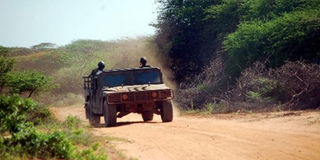Kenya taken to task over Kismayu civilian deaths

A Kenya army military jeep cruises past the Ishakani border point on their way to the battle frontline where Kenyan troops were gearing up for an onslaught to Kismayu on October 26, 2011. Photo/FILE
What you need to know:
- Rights group claims three died from shells fired by naval forces
New York
The United Nations has reiterated its concerns about reports of civilian deaths in the Somalia port city of Kismayu said to have been caused by shells fired from a Kenyan warship.
A spokesman for Secretary-General Ban Ki-moon told reporters at the UN headquarters in New York on Friday that the world agency stands by comments made on August 14 by Mark Bowden, its humanitarian coordinator for Somalia.
Mr Bowden said then he was “deeply concerned about reports of civilian casualties in Kismayu caused by naval gunfire and air strikes”.
Human Rights Watch reported on August 23 that three civilians — a pregnant woman and two boys aged 11 and 15 — were killed “apparently from shells fired by the Kenyan vessel” on August 11.
The spokesman for Kenya’s armed forces acknowledged that a Kenyan ship had fired four shells at what he said was an Al-Shabaab anti-aircraft position on the Kismayu jetty, Human Rights Watch reported.
An official with the African Union’s mission in Somalia (Amisom) has meanwhile disowned the naval attacks on Kismayu.
In comments published on September 6 by the UN’s humanitarian news agency, Amisom spokesman Col Ali Aden is quoted as saying: “We will take responsibility for our military strikes, but we will not be responsible for any non-Amisom strikes.”
Kenyan ground troops inside Somalia have been assimilated into Amisom, but its air and naval forces are not operating under the auspices of the African Union’s Somalia deployment.
Military forces
Amisom has neither air nor naval capabilities, Col Aden noted.
Human Rights Watch deputy Africa director Leslie Lefkow said last month that “the Kenyan authorities need to ensure that measures to minimise civilian casualties are in place for all its military forces, including those outside the Amisom mandate.”
“All forces should respect the laws of war, regardless of their status,” Lefkow added.




